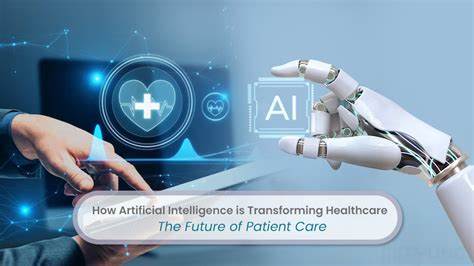Uncategorized
The Role of AI in Revolutionizing Healthcare: A Game Changer for the Industry
The Role of AI in Revolutionizing Healthcare: A Game Changer for the Industry
Artificial Intelligence (AI) is transforming industries worldwide, and healthcare is no exception. From improving patient outcomes to optimizing hospital operations, AI is rapidly becoming a vital tool in modern healthcare systems. In this article, we’ll explore the ways in which AI is shaping the future of healthcare, its benefits, challenges, and its potential to revolutionize the industry.
What Is AI in Healthcare?
It is the use of machine learning algorithms and other cognition-based technologies to simulate human intelligence in interpreting medical information that is complex. It helps healthcare professionals make accurate diagnoses, develop personalized treatment regimens, and enhance patient care. AI technologies are able to process enormous volumes of data in seconds, recognize patterns that would take humans to do so.
Advanced Diagnostics Maybe the most significant way It is revolutionizing healthcare is with better diagnostics. Machine learning programs can read medical images, such as X-rays, MRIs, and CT scans, to identify likely health issues like tumors, fractures, or infections. AI-enhanced diagnostic applications assist radiologists by offering faster, more accurate readings, leading to quicker diagnoses and earlier treatments.
Individualized Treatment Plans AI facilitates the creation of highly individualized treatment plans for patients. Based on a patient’s medical history, genes, and lifestyle factors, AI systems can suggest personalized treatments that are most likely to succeed. AI systems help doctors choose the most suitable medications, therapies, and operations for each patient, enhancing their overall health outcomes.
What Is AI in Healthcare?
Predictive Analytics Predictive analytics using AI is able to forecast future health issues before they occur. Using AI algorithms, huge amounts of patient information are processed with a view to forecasting conditions like heart disease, diabetes, and strokes to facilitate early treatment. Early diagnosis and prevention are crucial in reducing healthcare costs as well as increasing the quality of patients’ lives.
Enhanced Drug Discovery It is a long and expensive process to come up with drugs and medicines. AI accelerates the discovery of new drugs by reading the data available in order to predict how different compounds will behave in the body. This helps pharmaceutical firms develop new drugs quickly and efficiently, which may save lives as well as reduce development costs.
Remote Monitoring and Telemedicine Advances in wearable sensors and IoT-capable devices have enabled AI to enable remote patient monitoring to flourish. Wearable devices to track heart rate, blood pressure, and other factors can send real-time data to healthcare professionals. AI-powered systems can analyze the information and alert doctors to abnormalities, enabling early medical intervention. Furthermore, AI-powered telemedicine portals allow online consultations, enhancing access to healthcare, especially in remote areas.
Benefits of AI in Healthcare
Increased Efficiency and Accuracy AI can scan massive amounts of information at a moment’s notice, reducing the possibility of human error and improved decision-making. This allows healthcare professionals to focus more on patient care rather than paperwork. AI diagnosis is more precise, reducing misdiagnosis and improving patient safety.
Saving money By enhancing efficiency and preventing costly medical errors, AI lowers healthcare costs. Early detection and tailored treatments will prevent the need for additional pricier treatments in the future, money that is saved by patients and healthcare providers.
Access to Healthcare
AI healthcare solutions enhance medical care access, especially to underserved populations. Telemedicine and remote monitoring simplify patients’ access to care without the need to travel far. AI also assists healthcare professionals during diagnosing of rare conditions, providing access to skillsets that may otherwise be inaccessible.
Improved Patient Experience AI improves the patient experience with customized treatment, speedier diagnosis, and more efficient treatment. AI-based chatbots and virtual assistants also aid in appointment scheduling, physician questions, and follow-up visits, opening healthcare to everyone.
Challenges and Considerations
While AI is replete with potential in healthcare, its implementation comes with several challenges:
Data Privacy and Security Because AI systems operate on patient data, security and privacy of the sensitive information are of utmost concern. Robust cybersecurity protocols must be established by the healthcare providers to protect patient information from unauthorized use and compromises.
Ethical Issues Its application also raises ethical issues, including the possibility of biases in algorithms. AI can be only as impartial as the data on which they are trained, and if the data is biased, the bias will be carried through in the decisions of the AI. Fairness and transparency in AI-based healthcare are critical.
Regulation and Oversight Deployment of AI in the healthcare sector must be regulated for efficacy and safety. Regulatory bodies must develop and enforce guidelines for AI software to be used in a clinical setting. Adequate testing of AI systems prior to use will prevent unintended effects.
Integration with Existing Systems AI integration into existing health infrastructure is not always simple. The majority of the healthcare systems are outdated, and it may require a lot of money and time to update them to incorporate AI technology. Training healthcare providers on how to use AI tools is also vital to help them use them effectively.
The Future of AI in the Health sector
The future of AI is bright with a lot of breakthroughs ahead. AI is expected to find extensive applications in such fields as personalized medicine, robotic surgery, and gene editing. With continuous improvement in technology, AI will be a part and parcel of healthcare systems in the world. Improving outcomes, efficiency, and patient care.
Conclusion
AI is transforming the healthcare industry with innovative advancements in diagnostics, treatment, and patient care. Admittedly, there are challenges to be overcome, but the potential of AI in healthcare cannot be refuted. With increasing innovation, regulation, and ethics involved, AI has the ability to transform the process of healthcare delivery for the better. Making it more efficient, accessible, and precise than ever before.

